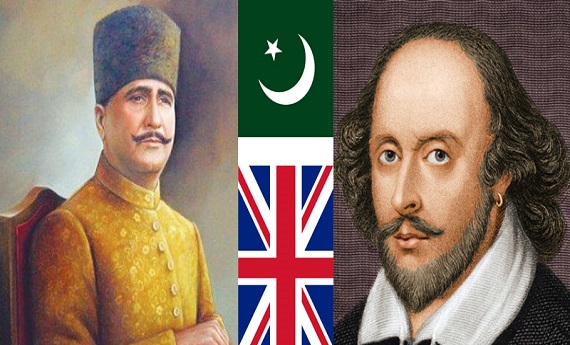A Tribute to Two Literary Geniuses

Pakistan consulate, Birmingham, the Shakespeare Birthplace Trust and Iqbal Academy (UK) to host joint celebration, Iqbal and Shakespeare: A Tribute to Two Literary Geniuses to mark Iqbal’s birthday, 9 November

Plus: Launch of Young Writers and Artists competition – The Landscape of My Youth
The Pakistan Consulate, Birmingham, the Shakespeare Birthplace Trust and the Iqbal Academy will host a joint celebration of two of the world’s leading writers, Shakespeare and Iqbal on 9 November, the birthday of Dr, Sir Allama Mohammad Iqbal, the renowned poet-philosopher of the East who is regarded as a founding father of modern day Pakistan. It is the first time that Iqbal’s birthday, a national annual holiday in Pakistan, has been feted at the Shakespeare Centre in Stratford-upon-Avon, the home of Britain’s greatest poet. The evening of music and poetry performance will bring together leading figures from both literary traditions and the wider community to promote inter-cultural appreciation and understanding.
The programme will feature some of Iqbal’s best-loved poetry performed in Urdu and English, including Shikwa, Jawab-e-Shikwa (The Complaint, The Response to the Complaint) and his message to the youth Lab Pe Aati Hai Dua, a child’s prayer to God which is frequently sung in schools in Pakistan and across Asia, performed by a cast of children from Birmingham. Actors from the Shakespeare Birthplace Trust will present complementary sonnets and extracts from Shakespeare’s cannon, and Iqbal’s poem in praise of Shakespeare*. Dhanak Music Group will bring live Sufi music inspired by Iqbal, featuring tabla, sitar, harmonium, flute, earthen pitcher and vocals.**
Mr Syed Ahmed Maroof, the Consul General of Pakistan in Birmingham said, “Though they lived and wrote more than two centuries apart, Shakespeare and Iqbal both speak to people around the world. Their poetry relates to human emotions which transcend national and cultural boundaries. We are delighted and honoured that the birthday of Pakistan’s legendary poet-philosopher, who bridged the cultural, intellectual and spiritual traditions of East and West, will be celebrated at the birthplace of Britain’s greatest poet. This special occasion will help us to build stronger links and inter-cultural understanding between British and Pakistan communities here in the West Midlands and between nations.”
Dr Diana Owen, Chief Executive of the Shakespeare Birthplace Trust said, “We are proud to be associated, through Shakespeare’s legacy, with the literary geniuses of other nations. We are dedicated to the worldwide promotion of Shakespeare’s work and our centre here in Stratford is a natural hub – a global cultural meeting place – to connect people through Shakespeare. We are particularly keen to reach out to more communities in our region. I hope this collaboration with the Pakistan Consul and the Iqbal Academy will help us to start new conversations and forge new bonds of fellowship with our near neighbours in Birmingham and further afield.”
The Shakespeare Birthplace Trust and the Pakistan Consulate, Birmingham will also announce a competition challenging young writers and artists to capture ‘The Landscape of My Youth’ in poetry or paint. Elizabeth Dollimore, Outreach Manager at the Shakespeare Birthplace Trust said, “Shakespeare and Iqbal wrote memorably about the natural world around them and the lands of their birth, and we hope that this competition will be a showcase for equally compelling images in words or pictures from the young people of today. Entrants might take inspiration from the literary greats, or from a special, personal incident, scene or setting that has shaped their own life.”
Mr Syed Ahmed Maroof, the Consul General of Pakistan in Birmingham said, “Many young people will have heard of both our celebrated poets, but many will have only a passing acquaintance with any of their works. We hope this competition will encourage young writers and artists to explore Shakespeare’s and Iqbal’s works, and who knows, perhaps we will find the creative greats of the future.”
The competition is open to all young writers between the ages of 16 and 25. The winner of the poetry competition will be invited to participate in the 2017 Stratford-upon-Avon Poetry Festival (18-25 June 2017). The winning art entry will be displayed at Shakespeare’s New Place, Stratford-upon-Avon. The winners of both categories will also enjoy a weekend stay for them and a guest in Shakespeare’s home town. Entries will be judged by a panel representing Shakespeare and Iqbal.
Deadline for entries is 1 May 2017. Poems should be up to a maximum of 400 words. Artwork should be photographed or scanned as an image no bigger than A3 in size. Entries can be emailed to competitions@shakespeare.org.uk, or posted to The Shakespeare Birthplace Trust c/o E Dollimore, The Landscape of My Youth, Henley Street, Stratford upon Avon, CV37 6QW.
Notes to editors:
- * A plaque of Iqbal’s poem to Shakespeare, was presented by the Iqbal Academy and the Ministry of Culture, Pakistan to the Shakespeare Birthplace Trust in 2010. With calligraphy inscribed by a leading master of the genre Mr Rasheed Butt of Pakistan, it is on permanent display in the Shakespeare Centre.
- ** for details of Dhanak group members and music see below
ENDS
Press release issued by the Shakespeare Birthplace Trust. For more information, contact Alisan Cole, PR Manager on 01789 207132 / 07824 137638 or email alisan.cole@shakespeare.org.uk / pressinfo@shakespeare.org.uk
About the Shakespeare Birthplace Trust
The Shakespeare Birthplace Trust is the independent charity that cares for the world’s greatest Shakespeare heritage sites in Stratford-upon-Avon, and promotes the enjoyment and understanding of Shakespeare’s works, life and times all over the world. The charity runs formal and informal educational programmes for people of all ages. It holds the world’s largest Shakespeare-related museum and archives open free to the public, a collection which is designated as being of international importance. The Shakespeare Birthplace Trust receives no public subsidy or direct revenue funding; it depends on income generated through the support of visitors, donors, volunteers and Friends. For more information, visit www.shakespeare.org.uk.
The Iqbal Academy (UK) is dedicated to the dissemination of the message of the Poet-Philosopher of the East Allamah Dr Sir Muhammad Iqbal (1877-1938). It was first established by Mr Saeed Hassan Butt in Coventry, England, in 1971. The Academy was registered as a Charitable Trust. It was recognised by the Government of Pakistan, which gives it annual Grant-in-Aid. The founder died in 1983. In 1987, Dr Saeed Durrani became the new Chairman, and he greatly expanded the activities of the Academy.
Dhanak is a dynamic musical collective with a broad repertoire including authentic traditional Sufi, mehfil and urban music
Name: Khalil Anjum Instrument: Tabla*
Info: Khalil learnt to play the Tabla from the renowned musician Ustad Sarvar Sabri. He is the leader of the Dhanak Music Group and also arranges music performances that cater to all requirements.
* The Tabla is a membranophone percussion instrument (similar to bongos) which is often used in Hindustani classical music and in the traditional music of India, Pakistan, Nepal, Bangladesh, and Sri Lanka. It is also one of the main Qawwali instrument used in Pakistan and India.
Name: Meena Kumari
Info: Meena is the vocalist and harmonium*** player of the group. She got her musical talent from her father. She is an established music teacher and singer who specialises in folk songs, Ghazal* and Geet**
*Ghazal (Arabic/Persian/Urdu: غزل) is a poetic form consisting of rhyming couplets and a refrain, with each line sharing the same meter. A ghazal may be understood as a poetic expression of both the pain of loss or separation and the beauty of love in spite of that pain. The form is ancient, originating in Arabic poetry in Arabia long before the birth of Islam **Geet (Song or Lyrical poetry) (hindi:गीत) (urdu:گیت) in Hindi and in Urdu may refer to any poem set to music that can be sung alone or as a duet or in chorus.)
***Harmonium is a type of reed organ, a freestanding keyboard instrument in which air is forced by manual or voluntary means over a set of free floating reeds by bellows. Its free-floating reeds are placed in slits in a windchest, whose valves are directly activated by the keys from a traditional organ-like keyboard via a set of pushrods and/or pull rods. The typical harmonium has one keyboard, but larger models with two or even three keyboards were also built.
Name: Waqus Choudhary Instrument: Flute
Info: Waqas Choudhary is a young versatile flute player. He learnt how to play from Ustad Iqbal Hussain (a renowned musician who worked as a top artist in All India Radio Akashwani for many years, receiving numerous awards from organisations and the government for his work in the music world). Waqus also is skilled in the gayaki and Tantrakari Ang.
*Gayaki – Gayaki is one of the several styles of singing.
**Ang – The term ‘Ang’ refers to the root to which a particular raga belongs. For example, Tantrakari Ang (instrumental style of music)
***Raga – Raga is the basic organisation of the thirteen musical notes in a composition, as per specific rules.
Name: Basharat Hussain Instrument: Sitar*
Info: Basharat is an up and coming artist and has been learning how to play the sitar from Rupa Panesar (a prominent UK-based female sitarist.)
* The sitar (English pronunciation: /ˈsɪtɑːr/ or /sɪˈtɑːr/; Hindi: सितार, sitāra pronounced [sɪˈtaːr]) is a plucked stringed instrument used mainly in Hindustani music and Indian classical music. The Hindi and Urdu word sitar originally derives from Persian seh + tar, literally meaning “three strings”.
Name: Mohsin Anjum Instrument: Ghara*
Info: Mohsin is a young percussionist who learnt his musical trade from his father who is the leader of this musical group.
* The Ghara of Punjab (dilu or changer in Sindh, mangay in NWFP, and noot in Kashmir) is actually a baked clay pitcher normally used for storing drinking water. Used to produce a fast rhythm, it is one of the most primitive percussion instruments known.

